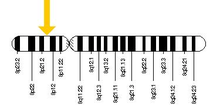ESCO2
| View/Edit Human | View/Edit Mouse |

The ESCO2 gene is located on the short (p) arm of chromosome 8 at position 21.1.
N-acetyltransferase ESCO2, also known as establishment of cohesion 1 homolog 2 or ECO1 homolog 2, is an enzyme that in humans is encoded by the ESCO2 gene.[3][4][5]
Function
This gene encodes a protein that may have acetyltransferase activity and may be required for the establishment of sister chromatid cohesion during the S phase of the cell cycle.[3]
Clinical significance
Mutations in the ESCO2 gene are associated with Roberts syndrome.[6]
See also
References
- ↑ "Human PubMed Reference:".
- ↑ "Mouse PubMed Reference:".
- 1 2 "Entrez Gene: establishment of cohesion 1 homolog 2 (S. cerevisiae)".
- ↑ Vega H, Waisfisz Q, Gordillo M, Sakai N, Yanagihara I, Yamada M, van Gosliga D, Kayserili H, Xu C, Ozono K, Jabs EW, Inui K, Joenje H (May 2005). "Roberts syndrome is caused by mutations in ESCO2, a human homolog of yeast ECO1 that is essential for the establishment of sister chromatid cohesion". Nat. Genet. 37 (5): 468–70. doi:10.1038/ng1548. PMID 15821733.
- ↑ Hou F, Zou H (August 2005). "Two human orthologues of Eco1/Ctf7 acetyltransferases are both required for proper sister-chromatid cohesion". Mol. Biol. Cell. 16 (8): 3908–18. doi:10.1091/mbc.E04-12-1063. PMC 1182326
 . PMID 15958495.
. PMID 15958495. - ↑ Gordillo M, Vega H, Trainer AH, Hou F, Sakai N, Luque R, Kayserili H, Basaran S, Skovby F, Hennekam RC, Uzielli ML, Schnur RE, Manouvrier S, Chang S, Blair E, Hurst JA, Forzano F, Meins M, Simola KO, Raas-Rothschild A, Schultz RA, McDaniel LD, Ozono K, Inui K, Zou H, Jabs EW (July 2008). "The molecular mechanism underlying Roberts syndrome involves loss of ESCO2 acetyltransferase activity". Hum. Mol. Genet. 17 (14): 2172–80. doi:10.1093/hmg/ddn116. PMID 18411254.
Further reading
- Enjuanes A, Benavente Y, Bosch F, et al. (2008). "Genetic variants in apoptosis and immunoregulation-related genes are associated with risk of chronic lymphocytic leukemia.". Cancer Res. 68 (24): 10178–86. doi:10.1158/0008-5472.CAN-08-2221. PMID 19074885.
- Olsen JV, Blagoev B, Gnad F, et al. (2006). "Global, in vivo, and site-specific phosphorylation dynamics in signaling networks.". Cell. 127 (3): 635–48. doi:10.1016/j.cell.2006.09.026. PMID 17081983.
- Nishihara M, Yamada M, Nozaki M, et al. (2010). "Transcriptional regulation of the human establishment of cohesion 1 homolog 2 gene.". Biochem. Biophys. Res. Commun. 393 (1): 111–7. doi:10.1016/j.bbrc.2010.01.094. PMID 20116366.
- Vega H, Trainer AH, Gordillo M, et al. (2010). "Phenotypic variability in 49 cases of ESCO2 mutations, including novel missense and codon deletion in the acetyltransferase domain, correlates with ESCO2 expression and establishes the clinical criteria for Roberts syndrome.". J. Med. Genet. 47 (1): 30–7. doi:10.1136/jmg.2009.068395. PMID 19574259.
- van der Lelij P, Godthelp BC, van Zon W, et al. (2009). "The cellular phenotype of Roberts syndrome fibroblasts as revealed by ectopic expression of ESCO2.". PLoS ONE. 4 (9): e6936. doi:10.1371/journal.pone.0006936. PMC 2734174
 . PMID 19738907.
. PMID 19738907. - Tomkins D, Hunter A, Roberts M (1979). "Cytogenetic findings in Roberts-SC phocomelia syndrome(s).". Am. J. Med. Genet. 4 (1): 17–26. doi:10.1002/ajmg.1320040104. PMID 495649.
- Strausberg RL, Feingold EA, Grouse LH, et al. (2002). "Generation and initial analysis of more than 15,000 full-length human and mouse cDNA sequences.". Proc. Natl. Acad. Sci. U.S.A. 99 (26): 16899–903. doi:10.1073/pnas.242603899. PMC 139241
 . PMID 12477932.
. PMID 12477932. - Schüle B, Oviedo A, Johnston K, et al. (2005). "Inactivating mutations in ESCO2 cause SC phocomelia and Roberts syndrome: no phenotype-genotype correlation.". Am. J. Hum. Genet. 77 (6): 1117–28. doi:10.1086/498695. PMC 1285169
 . PMID 16380922.
. PMID 16380922. - Kim BJ, Kang KM, Jung SY, et al. (2008). "Esco2 is a novel corepressor that associates with various chromatin modifying enzymes.". Biochem. Biophys. Res. Commun. 372 (2): 298–304. doi:10.1016/j.bbrc.2008.05.056. PMID 18501190.
- Schulz S, Gerloff C, Ledig S, et al. (2008). "Prenatal diagnosis of Roberts syndrome and detection of an ESCO2 frameshift mutation in a Pakistani family.". Prenat. Diagn. 28 (1): 42–5. doi:10.1002/pd.1904. PMID 18186147.
- Resta N, Susca FC, Di Giacomo MC, et al. (2006). "A homozygous frameshift mutation in the ESCO2 gene: evidence of intertissue and interindividual variation in Nmd efficiency.". J. Cell. Physiol. 209 (1): 67–73. doi:10.1002/jcp.20708. PMID 16775838.
External links
| Wikimedia Commons has media related to ESCO2. |
This article incorporates text from the United States National Library of Medicine, which is in the public domain.
This article is issued from Wikipedia - version of the 5/29/2016. The text is available under the Creative Commons Attribution/Share Alike but additional terms may apply for the media files.